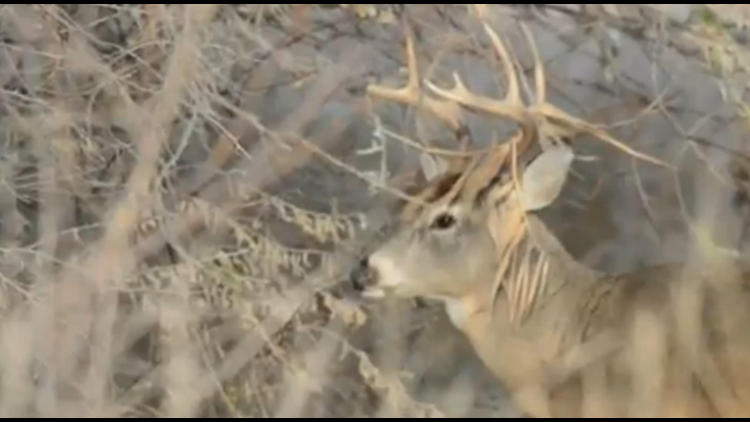MISSOURI - There are about 500,000 deer hunters in Missouri.
Now, a relatively new disease threatens the very game they seek.
Increasingly prevalent in several Western and Midwestern states, chronic wasting disease was first recorded in wild Missouri deer in 2012.
That weighs heavily on deer hunter and landowner C.L. Faubus of Brighton.
"I've not hunted deer in Missouri because of wasting disease and blue tongue (another deer disease)," said Faubus. "It's nice to know it's not as rampant here as one might expect. But my wife is concerned about me getting a diseased deer. The test they do, I don't trust it. I spent too much time overseas to trust meat you don't know about."
Researchers say there's been no confirmed case of a human contracting CWD from eating infected deer meat, though the agency recommends against consuming any meat that tests positive for CWD.
Tim and Holly Welch of Bolivar have a different take on CWD than Faubus. Tim Welch has hunted deer with rifle and bow for many years. He said he's "not too worried about it," even though CWD was recently confirmed in a deer in Polk County.
"I think if you take the right precautions and do the testing prior to eating one, you'll be OK," he said.
Photos: KTHV, MDC
Deer hunter Ben Scofield has been a lifelong hunter and founded Missouri Whitetails, a popular hunting forum on Facebook with hundreds of members.
He said he has watched fellow hunters talk about CWD encroaching into Missouri's landscape, along with the Missouri Department of Conservation's efforts to stop it. Does he think CWD is a real threat to Missouri's wild deer?
"I'm undecided," Scofield said. "There's a lot of information out there on both sides. Our (CWD) numbers are really low, compared to Western states."
He believes CWD could become a threat to Missouri's deer hunting industry if the disease becomes more prevalent and deters people from wanting to take up hunting. But he's not sure that targeted culling — where the conservation department and landowners remove large numbers of deer in small areas where CWD has been confirmed — is a good way to slow the disease.
"I think the kill-offs are too dramatic a step," he said. "If prions (the aberrant proteins that cause CWD) can live for a long time in the environment, well, you can't prevent deer from moving back into those same places. I'm not in favor of doing nothing. I'm just not sure what we should do."
Scofield said he's not worried about eating deer meat that has tested negative for CWD, a free service offered by MDC. He said he tracks the latest science reports about CWD. Would he ever stop hunting because of CWD?
"I'd want to see conclusive evidence that it has jumped species to humans," he said. "I will make drastic changes if that happens."
Bowhunter Michael Heffernon of Ozark said he grew up hunting and knows about CWD elsewhere in the state. He's thankful so far it hasn't appeared near him.
"Honestly, where I hunt (in Taney County) we haven't been affected with it," Heffernon said. "I'm leaning toward not yet being worried about it. But if it got to be a thing where it was spreading like wildfire, it would definitely worry me."

He said he's not a fan of MDC's targeted culling to slow the disease.
"I feel for those people trying to hunt in those areas — they're taking a big chunk out of the deer population with culling," he said.
He said he thinks it might be best to "let nature take its course."
"I think if it does spread, it's going to eventually wipe itself out," he said. "I think the deer population will bounce back."
Property owner Billy Harris, who lives in Franklin County, said he supports MDC's culling program. In fact, he participated in that effort when CWD was discovered within five miles of his property last fall.
"I was a little skeptical at first, but they were wanting to see what the concentration of CWD was in our area," Harris said. "They want to remove them and see how concentrated it is and see if it grows back or slows down. We need to do it for a couple years to see how it's doing."
Harris said CWD won't deter him from hunting, though he plans to have any deer he kills tested for the disease before he'll eat any of the meat.
"Yes, I'm going to get it tested for peace of mind," he said. "My wife is pregnant with twins, so I don't want to do anything that could harm them."
CWD information meetings
The conservation department is holding several free presentations about CWD at various locations in the state.
The next one will be Oct. 25, at the Silver Dollar City Parlor Meeting Room in the Keeter Center on the campus of College of the Ozarks in Point Lookout, 100 Opportunity Ave.
It will begin at 6:30 p.m. with a presentation by MDC staff and end at 8:30 p.m.
Other meetings are scheduled:
- Oct. 16 in Kirksville at the MDC Northeast Regional Office, 3500 S. Baltimore St.
- Oct. 18 in Jefferson City at the MDC Runge Conservation Nature Center, 330 Commerce Drive
- Oct. 23 in Perryville at the Perry Park Center in the Theater, 800 City Park Drive
Topics covered will include general information on CWD, MDC’s efforts to monitor and manage the disease, proper deer-carcass handling and disposal to help limit the spread of the deadly deer disease, how hunters can Share the Harvest of deer harvested in areas with CWD, MDC’s voluntary CWD testing efforts statewide all deer season, MDC’s upcoming mandatory CWD sampling for certain counties the opening weekend of firearms deer season, and more.
MDC staff will also be available to answer questions and will collect public feedback regarding potential regulations to help limit the spread of CWD.
More on CWD:



